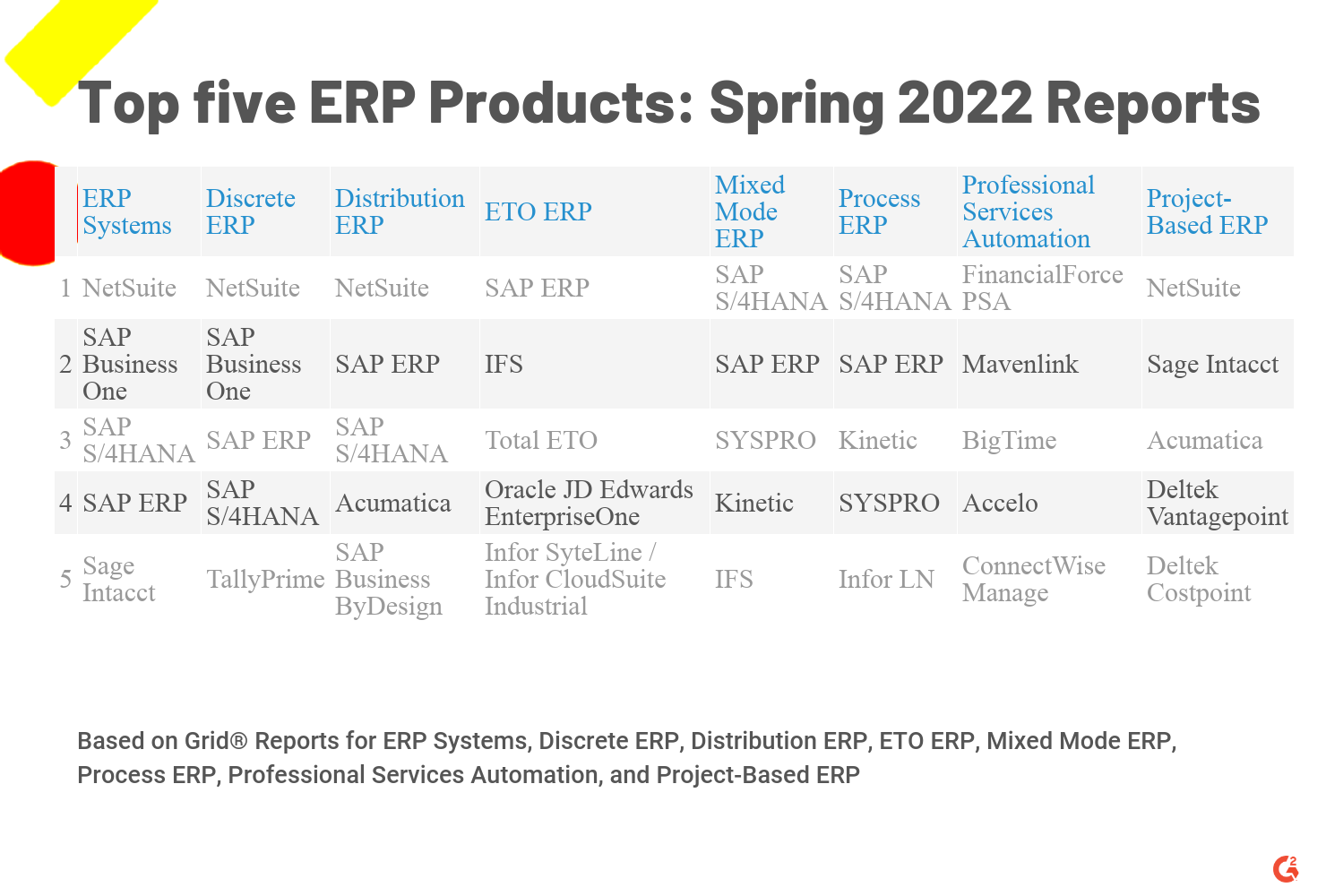Enterprise resource planning (ERP) is probably one of the most mature software markets, which usually experiences few significant advancements other than the occasional merger or acquisition. At the same time, many changes in the industry may not be considered groundbreaking but can considerably impact ERP buyers and users.
For instance, SYSPRO released a new version of its product in November 2021, Acumatica announced Acumatica 2021 R2 in September 2021, and Netsuite acquired Verenia, a provider of CRM and CPQ solutions, to name a few.
These changes may not revolutionize the ERP market but can impact user satisfaction. And the best way to understand any change in user satisfaction is to analyze user reviews. G2 publishes quarterly reports which provide an overview of the products listed in a category, based on the ratings assigned to each product by reviewers.
Let us analyze G2's Spring 2022 ERP reports and see what's happening in the ERP software market.
Who’s who in G2’s Spring 2022 ERP Reports
Combining report data from all ERP categories will help us find out the main players in the market as well as identify major trends. This information can be useful for buyers looking for ERP software as well as anyone interested in learning more about the market.
For those unfamiliar with ERP, it's important to know that while there are hundreds of ERP products, only a few vendors dominate the market, the most important being SAP and Oracle with a combined market share of more than 50%. This doesn't mean that their ERP products are the best in the market. Other vendors provide excellent ERP software, often specialized in industry sectors such as manufacturing or professional services.
Among the top five products across all ERP categories in G2’s Spring 2022 reports, most major vendors such as Infor, Oracle, and SAP are present with multiple products. However, the most noticeable absence is Microsoft, whose ERP products did not achieve high enough Satisfction scores to rank in the top five for any category. Also, although Sage Software has multiple products, only Sage Intacct is present in the top five for two categories: ERP Systems and Project-Based ERP.

Tier 2 and 3 vendors offering robust ERP distribution and manufacturing products are also present, such as Acumatica, IFS, Kinetic (previously Epicor), and SYSPRO. Reviewers consider these solutions to be viable alternatives to SAP, Oracle, and Infor products since they provide similar features. It's also worth mentioning that all top five products in the Professional Services Automation category are entirely different from the top solutions in all other categories, which shows that newer players, rather than traditional vendors, better serve this market. This could be explained by the fact that traditional ERP vendors preferred to focus on other industries such as manufacturing and distribution.
Some products in the Spring 2022 report had changes in rankings compared with the previous reports from Winter 2022. Changes in rankings in G2 reports occur when products receive new reviews that impact their scores. For ERP software categories, most changes were seen in the ERP Systems category, the most important being Dolibarr ERP CRM, which went up the list by 24 positions, while ERPNext lost 19 positions.
Other significant changes in rankings are described in the graph below:
Five ERP solutions have newly qualified for the G2 Spring 2022 reports, which means that they received 10 reviews or more for each category:
- Workday Enterprise Planning in ERP Systems (ranked 53 out of 72 products)
- Multiview ERP in ERP Systems (ranked 35 out of 72 products)
- Epicor iScala in Discrete ERP (ranked 33 out of 39 products)
- Cloud Coach in Project-Based ERP (ranked 31 out of 34 products)
- ConnectWise Manage in Professional Services Automation (ranked 5 out of 34 products)
|
Want to find detailed information on all products included in G2's reports for ERP categories? Explore all G2 Spring 2022 reports. |
Top vendors and rank changes provide an incomplete picture of the ERP market, so it is also important to look at the overall satisfaction and reviewer feedback for all categories.
How does reviewer satisfaction vary by ERP category?
Other than Star Ratings, G2 reviewers can score products based on multiple quantifiable criteria. Some examples are Ease of Use, Ease of Setup, Ease of Admin, Ease of Doing Business With, Quality of Support, and Meets Requirements. Reviewers can evaluate all of these on a scale from 1 to 7, where one is the lowest score and seven is the highest. G2 converts these results to a 0-100% scale for convenience.
Let's look at the Simple Six ratings for the five most popular ERP categories in terms of traffic and number of reviews. At first glance, everything looks great. All average ratings are high or very high for all categories (left graph), but a few essential differences emerge if we drill down (right chart).
For the criterion, Ease of Setup, buyers have given the lowest ratings to products across all ERP categories, especially for Distribution ERP, Discrete ERP, and Project-Based ERP, with average scores of 72%,75%, and 71%, respectively. This is not surprising since ERP is still a complex system which makes it difficult for buyers to set up correctly. But what exactly are the challenges users are facing when setting up ERP? To learn more about it, I looked at the feedback provided by reviewers. Here's what I found:
- While reviewers think that setting up ERP systems is complicated, they also seem to agree that the initial effort is worth it since it improves performance in the long run.
- Setup often requires vendor involvement or internal expertise that many companies do not have, especially SMBs. Reviewers also mentioned working with value-added resellers (VARs) and consultants for the setup.
- Interfaces can be clunky with redundant options and not always straightforward. A few examples mentioned by reviewers were creating and managing new employees, roles, and access rights, which can be convoluted and time-consuming.
- Reporting features can be cumbersome, especially when it comes to customizing. Much manual work seems to be spent creating reports, and dashboards can be limited.
- Too much flexibility can also be an issue, especially when too many options are available. As one reviewer put it: "The setup is flexible but complex, with many moving parts."
Generally speaking, ERP setup tends to be more challenging for companies with complex processes, such as medium to large manufacturers or distributors. At the same time, setup difficulty may vary by product, so it's highly recommended that buyers understand how each solution can be set up correctly.
G2 has more to offer about ERP categories and vendor rankings
All the information above, and much more, is available on G2, either via G2 reports or on each category page which includes a list of highest rated and easiest to use products with detailed scores. Filters are also available to find top products by company size and region. For instance, the image below shows the top 10 Discrete ERP products for small businesses in North America.
The key to the right ERP software is in the details
Differentiating between ERP solutions that are very similar isn’t easy and it takes some digging into the data. At G2, review data changes constantly as new reviewers share their feedback and rate software.
I don’t expect to see major changes anytime soon but what matters most when comparing ERP solutions are finer details like the ease with which the software can be set up. My goal is to analyze G2 ERP reports data on a regular basis and identify new trends or highlight existing challenges that may impact buyers.
| Read More: How to Use Software Reviews to Keep ERP Selection on Track → |
Want to learn more about ERP Software? Explore ERP products.

Gabriel Gheorghiu
Gabriel’s background includes more than 15 years of experience in all aspects of business software selection and implementation. His research work has involved detailed functional analyses of software vendors from various areas such as ERP, CRM, and HCM. Gheorghiu holds a Bachelor of Arts in business administration from the Academy of Economic Studies in Bucharest (Romania), and a master's degree in territorial project management from Université Paris XII Val de Marne (France).
